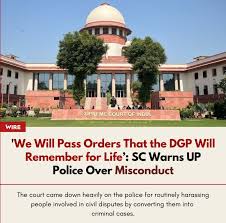Tell UP Police DGP, if the practice of registering criminal cases in Civil cases is not stopped immediately, we will pass such orders that the DGP will remember for his whole life, warns the Supreme Court:
The Supreme Court has issued a stern warning to Uttar Pradesh Police for their practice of harassing people involved in civil cases by twisting their issues into criminal cases.
In an unprecedented warning the court, keeping in mind the situation in which innocent persons were being dragged by the police said, it would pass orders that the UP Director General of Police (DGP) would remember for the rest of his life.
A bench of Justices Surya Kant and Ujjal Bhuyan was hearing an anticipatory bail plea by a person against whom a dozen cases related to various land disputes had been filed by the police.
On his part, the UP government senior advocate Rana Mukherjee told the court that the accused had not been cooperating with the investigations and was instead seeking protection from arrest.
At this, the court remarked that the accused was probably afraid that the police would slap another case against him if he appeared.
“He appears not to be appearing because he knows that you will register another false case and arrest him. “Convey to the DGP the moment the petitioner is touched, we will pass such a drastic order he will remember his whole life.
You have been slapping one FIR after the other on him. Every time you come with a new FIR against him.
It’s easy to accuse a person of land-grabbing. A person who purchased land by a registered sale deed is being dubbed as a land grabber!
What type of dispute is this Civil or Criminal?
The court remarked the UP Police are registering criminal cases in purely civil disputes.
Tell your DGP that if this practice does not stop immediately, we will pass such drastic orders, he will remember for his whole life,” the bench added.
When Mukherjee said that if the police did not abide by the court’s instructions, he would return the case to the government, the court said that the bench’s remarks were aimed at the police’s conduct and told Mukherjee that he should use his office to drive home the court’s message.
“Let him join the investigation but don’t arrest him. And if you bonafide think that in a particular case, arrest is required, then come and tell us that these are the reasons. But if the police officers are doing, you take it from us, we will not only suspend them, they will lose something more, the court said.
The police were also instructed to send a summons to the accused on his mobile phone, specifying the date, time, and place where he should appear before the investigating officer.

